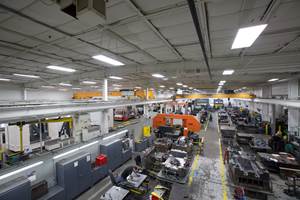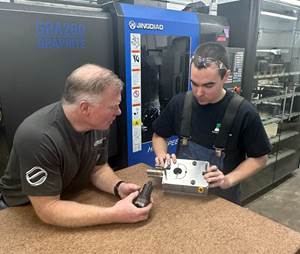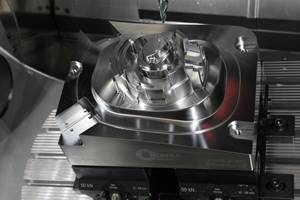A Cadillac Machine at a Chevy Price
Reliability, performance and value make Nexus machining a winner for Libbey Glass.
As the number-one producer of glass tableware in North America, Libbey, Inc. runs its Shreveport, LA plant around the clock, seven days a week. Products produced here range from drinking glasses, martini shakers, flower vases, glass plates and bowls to decorative glass and tableware for an array of restaurants, hotels and airlines.
Every item that Libbey makes has several molds for producing it, which makes the moldmaking and mold repair shop a critical component of the Libbey operation. Critical to Libbey's machine shop is the most reliable and productive machine tools it can afford.
In October 2002, Libbey took delivery of its new VC Nexus 410A vertical machining center, the latest model from Mazak Corporation (Florence, KY). The new Nexus series of machining and turning centers from Mazak is designed from the ground up to achieve new levels of productivity and reliability for vertical machining and turning tasks.
"We were constrained on price and had the money allocated for another brand of machine," says Walter Britton, machine shop supervisor at Libbey, "when we found Mazak had a machine in this price range with standard features that were options on the other machine. It became apparent that we could obtain a Cadillac machine at a Chevy price."
No Convincing Necessary
Libbey's machine shop is set up to service the forming lines that produce the company's wide range of products. Glassware manufacture involves molding molten glass at approximately 2,300xF, a main reason there are so many backup molds for each product and why mold repair and upkeep is so important. "About 90 percent of the work we do is mold repair," Britton says, with the majority of materials being stainless, nickel/aluminum/bronze alloys or cast iron.
Mold repair is not a high-volume operation, but accuracy and turnaround time are vital. "These molds take a lot of abuse, and there will be times that every machining center in the shop is running to support the production lines," Britton says. Machine setup on the new VC Nexus 410A was completed on October 29, and its first production job was running October 31, machining 0.01 in. off the top of snuffers (ash tray molds) with a 0.1875-inch ball endmill. "We could not have been up and running so soon if we had purchased another brand of machine," notes Mark Gruner, Libbey machinist and CNC programmer. "Libbey has an excellent history with Mazak machine tools. The newest machine has many new features that our 1987 model does not, yet the similarities enabled us to cut chips the next day."
No one at Libbey needed convincing to go with Mazak, Britton concurs. He calls the company's purchase of a Mazak AJV 25/405 vertical machining center in 1987 one of the company's most profitable investments at that time. "We keep meticulous records of the parts run on that machine. In the first year, it nearly paid for itself. The request in 1988 to purchase a Mazak Quick Turn 10N went through with no questions," he says.
Reliability was one of the primary factors influencing the choice of Mazak equipment. "The Nexus 410A is replacing a competitor's machine because of unacceptable downtime," Britton says. "We've found Mazak service to be impeccable. Calls are returned promptly and repair technicians are on site quickly. We know this machine will be here ten years from now."
Programming ease was another reason. Although Libbey had the money appropriated for another brand of machine, this would have necessitated learning an entirely different programming and control system. The Mazatrol CNC on Libbey's new Mazak equipment combines Mazatrol conversational and traditional EIA programming with a powerful sixty-four-bit RISC processor and powerful 3-D graphic simulation to optimize toolpath and cycle time. Although the Nexus acquisition price was a few thousand dollars higher than the money Libbey had budgeted, Britton and Gruner could easily justify the difference with the staff's familiarity with Mazatrol. "We would have easily spent more on training," they say, and the Nexus 410A is immediately accessible to their database of part programs.
High Accuracy and Environmental Friendliness
With mold repair, the main priority of Libbey's machine shop is to return each mold to original specifications as quickly as possible. The Nexus 410A features a powerful 25-hp, 12,000-rpm AC spindle motor that increases torque in the lower range and enhances performance in the high range. Spindle speed in the Nexus represents a 20 percent increase over previous models and horsepower a 25 percent increase. The chip-to-chip tool-change time is 2.7 seconds.
Precision linear guide ways are used on all axes for maximum accuracy and rigidity. Rapid traverse rates of 1,417 ipm are a result, as well as positioning accuracy of plus or minus 0.0002 in. High-gain digital AC servo motors are coupled directly to the ballscrews, eliminating the need for belts and gears that can otherwise negatively affect machine accuracy. Libbey's machine also has an optional NC rotary table package with an eight-inch diameter rotary table that has a 1.57-inch through hole servo motor and servo amplifier.
The Nexus design is environmentally friendly as well. An automatic save-energy mode shuts the machine down when not in use, which can cut electric power consumption up to 20 percent. The Nexus grease lubrication system reduces waste oil by 57 percent, and the absence of tramp oils from the linear guide lubrication system extends coolant service life. In addition, all solenoids, valves and fluid level gauges are mounted on a single panel, making a visual status check quick and easy.
Like many manufacturers, Libbey faces unrelenting demands for machining accuracy and reliability, and ultimately the issue is cost. Obtaining a Cadillac machine at a Chevy price satisfies all of these requirements.
Related Content
Design Strategy Tackles Big and Small Complexity Challenges for Southeastern Mold Builder
Delta Mold Inc.’s core values, engineering expertise, five-axis machines and molding capabilities help the team turn a proposal into a manufactured mold or part with custom design, finishing and assembly.
Read MoreFive-Axis Graphite Mill With Automation Debottlenecks Electrode Machining
Five-axis electrode cutting enabled Preferred Tool to EDM complex internal screw geometry on an insert that otherwise would have had to be outsourced.
Read MoreTen Things You Need to Know about Circle Segment Milling
Considerations for evaluating if circle segment end mills or conical barrel cutters are right for your mold machining applications.
Read MoreFive-Axis Vertical Mill Increases Mold Shop Capacity by Reducing Setups
Zero Tolerance now processes blocks — from squaring to waterline drilling to rough and finish milling — on a single five-axis CNC mill, reducing setups and moving blocks in/out of multiple machines without sacrificing accuracy and surface finish.
Read MoreRead Next
Reasons to Use Fiber Lasers for Mold Cleaning
Fiber lasers offer a simplicity, speed, control and portability, minimizing mold cleaning risks.
Read MoreHow to Use Strategic Planning Tools, Data to Manage the Human Side of Business
Q&A with Marion Wells, MMT EAB member and founder of Human Asset Management.
Read MoreAre You a Moldmaker Considering 3D Printing? Consider the 3D Printing Workshop at NPE2024
Presentations will cover 3D printing for mold tooling, material innovation, product development, bridge production and full-scale, high-volume additive manufacturing.
Read More




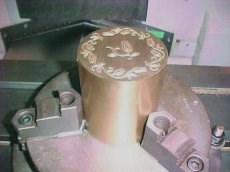
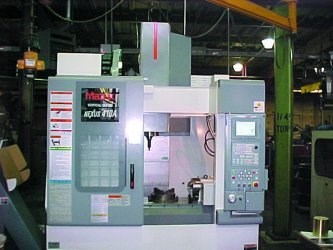




.jpg;maxWidth=300;quality=90)








